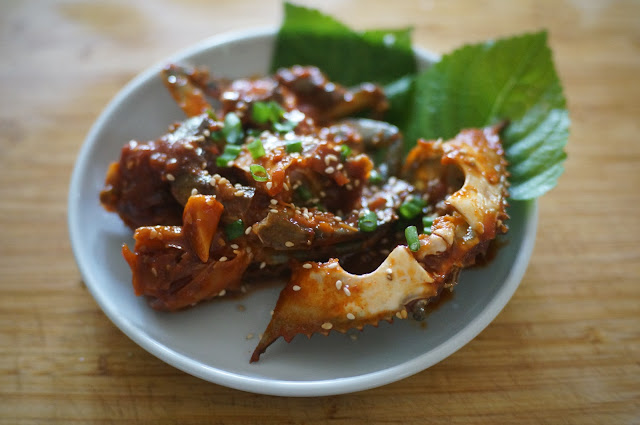Korean Spicy Marinated Raw Crab | Gyejang (양념계장)
Okay, so I made this dish during the summer but I got lazy and never published it and here we are like half a year later. I actually have half a dozen posts queued up to be written (photos are all edited and ready to go) but I've just been in that pandemic slump lately and unmotivated to do anything other than lie around like just a slobby piece of garbage. Obviously this situation isn't helped by the fact that we're in the juicy part of winter where the possibility of snow is lurking around every corner and I don't have a reliable running schedule and even though I still hate running, the secondary side effects (re: euphoric runner's high) are crucial to keeping my mood steady and positive.
Anyway, I made this Korean marinated crab dish because I'd watched some food video and it triggered a craving and blue crab happened to be in season (reminder that this was back in June 2021) and I whipped something up using whatever pantry seasonings struck my fancy. I ended up giving some to my favorite uncle and he flipped out saying it was one of the best things he'd ever tasted and that it was a waste that I didn't have a restaurant and that he would gladly invest in my restaurant if and when I decide to open one. To be honest, I enjoyed my own creation but I wouldn't go that far. It must've hit some nostalgic notes for my Korean elders though because even my dad (who is notoriously lazy with food and doesn't think mining for crab meat is worthwhile) silently enjoyed himself.
Ingredients [serves 4 to 60:
6 fresh crabs (blue crabs)
1 teaspoon sesame oil
1 tablespoon canola oil
5 to 6 cloves garlic
1" knob ginger
1 ripe pear
¼ cup brown sugar
⅓ cup soy sauce
⅔ cup red pepper paste (gochujang)
1 tablespoon sesame seeds
1 tablespoon apple cider vinegar
To make the sauce, heat a large pan over medium high and drizzle in some canola oil and sesame oil. There isn't a tremendous volume of sauce but using a large pot is just convenient because you can toss the crabs in the pot in the end and save yourself some dishes.
Chop some garlic and ginger and then roughly chop the pear and toss into the pan.
Once the pear basically turns into mush, add brown sugar, soy sauce, and gochujang. Mix to combine and then let the sauce warm up and allow the ingredients to sizzle together for a few minutes.
As a final step on the stove, add sesame seeds and stir. Allow the sauce to cool.
Once the sauce is cooled, stir in some vinegar.
When the crabs have passed away and are partially frozen, remove from the freezer and prep them. I just use kitchen sheers to snip off their little faces, I savagely rip out their gills, I snip off the little butt flap, rip off the top shell, and then I use a sharp knife to crack through their belly to cut them in half.
Add the crabs to the sauce and stir to coat. Even the top shells end up in the sauce because there are some good bits in there. Plus, it's a great conduit for mixing some rice into the sauce; it acts like a little bowl. Allow the crabs to marinate for about 4 hours in the fridge before serving and eating.
This is best served with plain old sticky rice. Set a pair of kitchen shears and tiny forks at the table to encourage your fellow diners to really rip into those bodies and get every ounce of gooey, spicy crab meat out and make their deaths worthwhile. Garnish with some scallions and sesame seeds if you want to break up the red color palette with some contrast.
These were pretty satisfying and I'm looking forward to making another batch when crab season rolls around again. The sauce is a great balance of savory, sweet, spicy, and just a little bit of acidity. The pear adds some body to the sauce, along with a subtle fruity note. I used the homemade gochujang made from the kit my aunt in Korea posted to us during the height of covid boredom and that made this dish feel a little more special.
Here's the recipe page:





















Thanks for this korean food recipe. The Korean language is so beautiful and korean greetings, I love learning new words and phrases.
ReplyDeleteThanks for sharing this post with us.
ReplyDeletePerfect & Fresh Birthday Cake For Husband
Yummy
ReplyDeleteYum
ReplyDeleteDelish
ReplyDeleteyum
ReplyDeleteWhen searching for a “locksmith Palm Beach”, drivers find reliable professionals offering mobile assistance and peace of mind on the road.
ReplyDelete